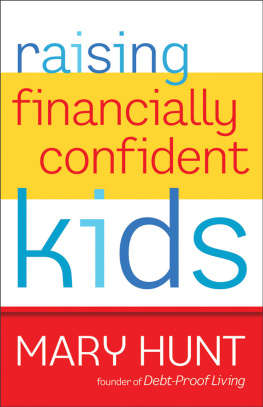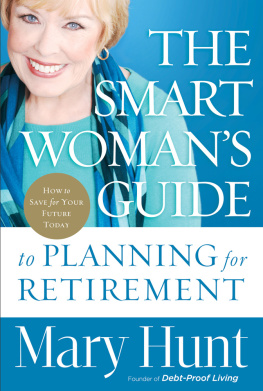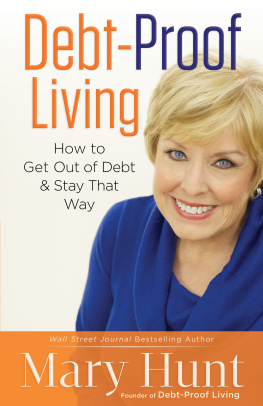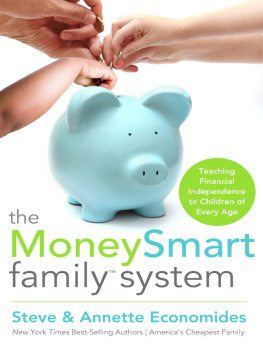Mary Hunt - Raising Financially Confident Kids
Here you can read online Mary Hunt - Raising Financially Confident Kids full text of the book (entire story) in english for free. Download pdf and epub, get meaning, cover and reviews about this ebook. year: 2012, publisher: Baker Publishing Group, genre: Home and family. Description of the work, (preface) as well as reviews are available. Best literature library LitArk.com created for fans of good reading and offers a wide selection of genres:
Romance novel
Science fiction
Adventure
Detective
Science
History
Home and family
Prose
Art
Politics
Computer
Non-fiction
Religion
Business
Children
Humor
Choose a favorite category and find really read worthwhile books. Enjoy immersion in the world of imagination, feel the emotions of the characters or learn something new for yourself, make an fascinating discovery.
- Book:Raising Financially Confident Kids
- Author:
- Publisher:Baker Publishing Group
- Genre:
- Year:2012
- Rating:3 / 5
- Favourites:Add to favourites
- Your mark:
- 60
- 1
- 2
- 3
- 4
- 5
Raising Financially Confident Kids: summary, description and annotation
We offer to read an annotation, description, summary or preface (depends on what the author of the book "Raising Financially Confident Kids" wrote himself). If you haven't found the necessary information about the book — write in the comments, we will try to find it.
Raising Financially Confident Kids — read online for free the complete book (whole text) full work
Below is the text of the book, divided by pages. System saving the place of the last page read, allows you to conveniently read the book "Raising Financially Confident Kids" online for free, without having to search again every time where you left off. Put a bookmark, and you can go to the page where you finished reading at any time.
Font size:
Interval:
Bookmark:

2012 by Mary Hunt
Published by Revell
a division of Baker Publishing Group
P.O. Box 6287, Grand Rapids, MI 49516-6287
www.revellbooks.com
Previously published in 1998 and 2006 under the title Debt-Proof Your Kids
Ebook edition created 2012
All rights reserved. No part of this publication may be reproduced, stored in a retrieval system, or transmitted in any form or by any meansfor example, electronic, photocopy, recordingwithout the prior written permission of the publisher. The only exception is brief quotations in printed reviews.
ISBN 978-1-4412-3821-4
Library of Congress Cataloging-in-Publication Data is on file at the Library of Congress, Washington, DC.
Scripture quotations are from the Contemporary English Version 1991, 1992, 1995 by American Bible Society. Used by permission.
Published in association with the literary agency of The Steve Laube Agency, 5025 N. Central Ave., #635, Phoenix, Arizona 85012-1502.
The internet addresses, email addresses, and phone numbers in this book are accurate at the time of publication. They are provided as a resource. Baker Publishing Group does not endorse them or vouch for their content or permanence.
Introduction
1 Developing Financial Confidence
2 What If My Kids Turn Out like Me?
3 Meet Uncle Harvey
4 A Plan to Call Our Own
5 Ready, Set, Launch!
6 Meltdown on Aisle 5!
7 Parentinga Curious Profession
8 Theyre Coming after Your Kids
9 Future Debtors of America
10 The Trouble with Debt
11 Tear Down Attitudes of Entitlement
12 Develop Financial Intelligence
13 Neutralize the Glamour of Easy Spending
14 The Preschool Years
15 Ages Six through Nine
16 Age Ten through Teen
Epilogue
Afterword
Notes
Index
s omething amazing happened on my way to getting a financially confident life. My kids got one too.
While our two boys, Jeremy and Josh, were still young, I awoke from a twelve-year spending coma to discover we were in the fast lane to financial ruin. I had done terribly with money and credit cards. Our situation brought new meaning to the term debilitating debt . We were in a horrible jam.
But even worse than the debt was this terrifying thought: What if our kids turn out like me? Were they learning from my behavior that they too were entitled to have what they wanted even when they didnt have the money to pay for it? Were they learning to worship money? Did they notice their mom trusting Visa and MasterCard more than she trusted their dadher husbandto take care of the family? Did she really trust God the way she believed she was demonstrating to her children through her life?
Clearly, I was setting my kids up to become powerless pawns in the hands of an eager credit industry that is poised to enslave them to a lifetime of debt.
My husband, Harold, and I had so many hopes and dreams for our childrenprecious gifts we believed were given to us for only a while to care for, develop, train, and love and then to let go. If things didnt change, we were about to mess them up. Big time.
We had to find a way to teach our boys the truth about consumer debt and money. They had to learn that if they opened their lives to it, debt could prevent them from reaching their potential. Debt could negatively impact their adult relationships, diminish their options, ruin their futures, and destroy their dreams.
Debt prevention was what we wanted to achieve with our boys. But how do you do that with kids who dont even know what debt is?
It seemed to me that if we could teach our children not to touch a hot stove, we could train them not to get burned by the lure of credit-card debt. If we could train them to look both ways before crossing the street, we could teach them to carefully read the fine print. If we could instill in them the value of delaying gratification, that could become a lifetime behavior.
Thats when we came up with the idea to debt-proof our boys by helping them develop financial intelligence, starting when they were quite young. Then when the time came, they would leave home with the skills, knowledge, and confidence to make wise financial decisions. We were on a mission to raise financially confident adults.
The following years proved to be remarkable in the Hunt home. I had a lot to learn and a huge financial mess to clean up. And the boys? They learned about personal finance right along with me.
Harold and I designed an aggressive, yet simple, kid-sized financial plan. In a nutshell, we assigned to each of our children a portion of the familys financial resources to manage, an amount commensurate with each sons age, needs, and ability. Yes, we handed over fairly large sums of money to their discretion and control. They had to go through basic training. They had rules to obey about giving and saving. They had expenses to cover, decisions to make, and consequences to suffer.
Because money management requires lots of responsibility, our boys learned the fundamentals of personal finance. They learned that to whom much is given much is required. Sure, they were just kids, but they werent playactingthis was the real thing. And our kids rose to the occasion. Wow, did they rise!
If our plan to debt-proof our kids had been a miserable failure, you can be sure you wouldnt be holding this book in your hands. And had I known I would someday tell the story and offer the plan to you, I wouldve taken notes.
Thankfully, I have something better than notes or lesson plans. I have the living results in Jeremy and Josh. I am eager to let you get to know them better in the chapters that follow.
If Ive learned anything from the stacks of mail Ive received over the years, its that kidsfrom all demographicsare leaving home and going into the real world knowing a lot of things. But money management is not one of them.
This is a chilling fact considering that the real world is where 90 percent of all divorces find their roots in financial disharmony; is poised and ready to lure your unsuspecting young adult into its horrible pit of non-mortgage consumer debt. No doubt about itwhat kids dont know about money can hurt them.
As parents, we make sure our kids get spiritual training, summer camp, and even private school. We enroll them in sports and expose them to music and computers to enrich, challenge, and develop them. We dole out wads of cash to make them good drivers. But a financial learners permit? Hands-on money training? Judging from the heart-wrenching letters Im receiving from parents, both single and married, I can tell you its not happening.
Financial awareness shapes responsible kids. Teaching kids about money allows them to experience real-life situations and make real decisions and mistakes while within the safety net of their parents care.
The debt-proofing process will make the adolescent years so much happier around your house. Thats because the process builds a childs confidence and problem-solving abilities and makes basic mathematic skills more practical. It teaches values such as honesty, responsibility, generosity, and hard work. And this process of debt-proofing kids is gratifying for parents because the results are measurable and tangible.
Because money has such universal appeal, Ive found that kids respond to it in similar ways, regardless of their temperaments or particular natural bents. Take my kids for instance. You could not find two more opposite people, unless, of course, you consider their parents.
Jeremy is gregarious, goal-oriented, excited, and, shall we say, controlling. Josh, our procrastinator, on the other hand, is calm, relaxed, and easygoing. But as different as they are in personality and temperament, when given the opportunity to manage money and make their own decisions, both became responsible and confident in all areas of their livesnot just in finances. Jeremy jumped right in and took control. Josh was less sure in the beginning and asked for advice along the way. But in the end, our plan produced the same result even though our subjects were and continue to be very different.
Font size:
Interval:
Bookmark:
Similar books «Raising Financially Confident Kids»
Look at similar books to Raising Financially Confident Kids. We have selected literature similar in name and meaning in the hope of providing readers with more options to find new, interesting, not yet read works.
Discussion, reviews of the book Raising Financially Confident Kids and just readers' own opinions. Leave your comments, write what you think about the work, its meaning or the main characters. Specify what exactly you liked and what you didn't like, and why you think so.












